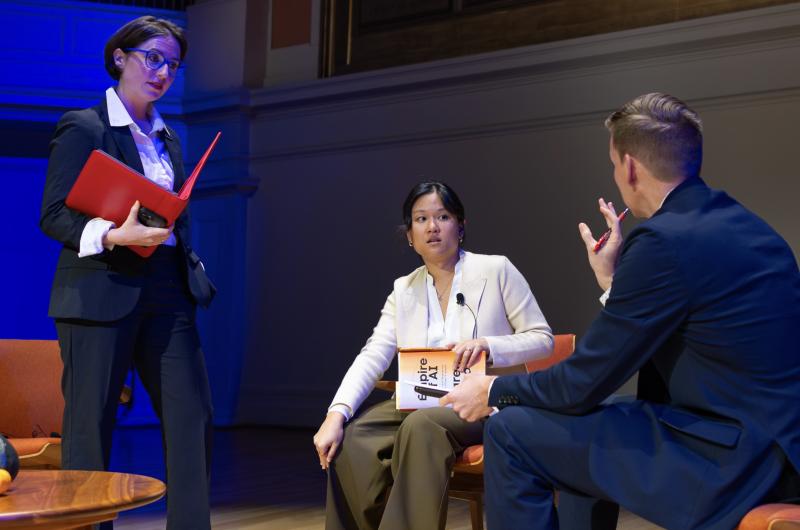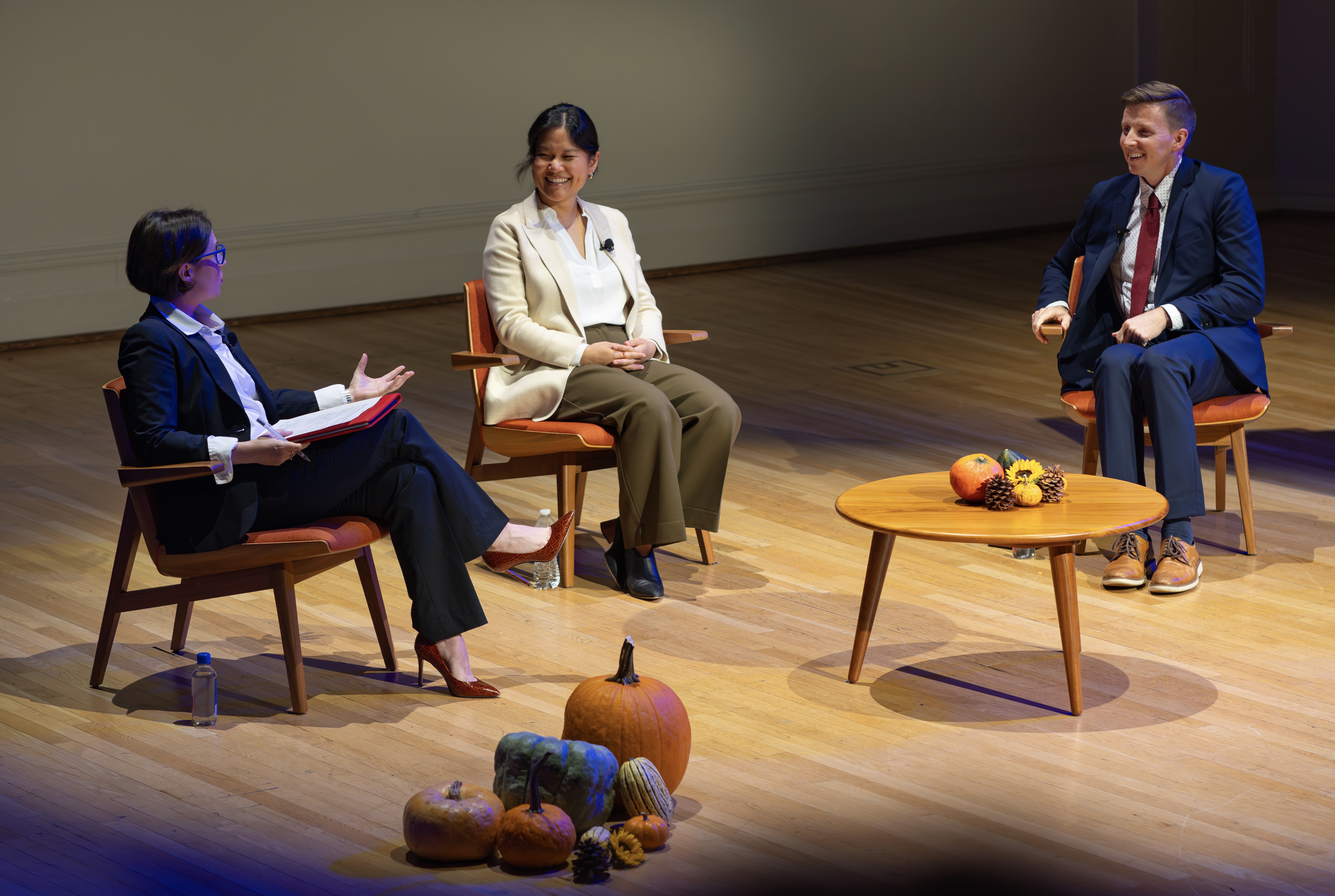Where the 'Empire of AI' is Leading Us

Tech journalist Karen Hao began reporting on artificial intelligence long before OpenAI and ChatGPT became synonymous with the technology in popular culture. In her Oct. 21 appearance at the University of Virginia for a public talk and panel discussion, the bestselling author of Empire of AI: Dreams and Nightmares in Sam Altman’s OpenAI, described how AI has evolved through the messy process of science and innovation.
Her celebrated book chronicles how a small cadre of tech companies controlling the development of AI technology are reshaping the world in its image. Speaking before a filled auditorium of UVA students, faculty and other community members at Old Cabell Hall, Hao said that cadre’s vision is leading us in an alarming direction.
Artificial intelligence is in fact a multitude of technologies that shapeshift and evolve, Hao said.
“Not merely based on technical merit, but based on the ideological drives of the people who create them, and the winds of hype and commercialization. While ChatGPT and other so-called large language models or generative AI applications have now taken the limelight, they are but one manifestation of AI, a manifestation that embodies a particular and remarkably narrow worldview,” she said.
And that worldview, Hao continued, is fueling the troubling trajectory of where this manifestation of AI is taking us.
“Under the hood, generative AI models are monstrosities built from consuming previously unfathomable amounts of data, labor, computing power and natural resources,” Hao said, comparing the empires of AI power players to those from a previous era of colonial empires.”
These empires of AI, she continued, “are not engaged in the same overt violence and brutality that marked this history, but they too seize and extract precious resources to feed their vision of artificial intelligence: the work of artists and writers, the data of countless individuals posting about their experiences and observations online, the land, energy and water required to house and run massive data centers and super computers.”
“So too,” Hao said, “do the new empires exploit the labor of people globally to clean, tabulate and prepare that data for spinning into lucrative AI technologies. They project tantalizing ideas of modernity and posture aggressively about the need to defeat other empires, to ride cover for and to fuel invasions of privacy, theft and the cataclysmic automation of large swaths of meaningful economic opportunities.”
A sharper focus on the human search for knowledge
Hao’s appearance was sponsored by UVA’s Digital Technology for Democracy Lab (co-led by Mona Sloane, assistant professor of media studies and data science), the Sloane Lab and the College and Graduate School of Arts & Sciences.
In her introductory remarks, Christa Acampora, Dean of the College and Graduate School of Arts & Sciences began with the provocative statement that she’s a liberal arts dean and thinks that AI can save us or destroy us.
“It can save the liberal arts” she said, “if it puts an end to the unsuccessful campaign that liberal arts defenders adopted about 75 years ago asserting that the main value of the liberal arts is that they teach transferable skills.”
Instead, she said, they “cultivate human capacities to seek and understand knowledge, discern the real from the fake, explore what is good for us to do and how to live together, realize beauty and understand its role in meaning and discerning patterns in nature that are also relevant for discovery, and understand the richness of our emotional lives and how that serves as a basis for empathy and meaning. AI brings that into sharper focus for us.”
These very same capabilities are necessary, she said, “for centering human needs and possibilities within and alongside the development of AI,” which is what Hao illuminates in her reporting.

Following Hao’s talk, Sloane moderated a panel discussion with Hao and Seth Lewis, UVA’s incoming Elcan Jefferson Scholars Foundation Distinguished Professor of Artificial Intelligence and Media Studies.
Hao suggested a different way forward to resist the narratives that she said OpenAI and the AI industry have fed us to hide a mountain of this technology’s social and environmental costs behind some elusive vision of progress.
“The empires of AI won't give up their power easily. The rest of us will need to wrest back control of this technology's future, and we're at a pivotal moment when that's still possible, Hao said.
“Policymakers can implement strong data privacy and transparency rules and update intellectual property protections to return people’s agency over their data and work,” Hao suggested. “Human rights organizations can advance international labor norms and laws to give data laborers guaranteed wage minimums and humane working conditions, as well as to shore up labor rights and guarantee access to dignified economic opportunities across all sectors and industries. Funding agencies can foster renewed diversity in AI research to develop fundamentally new manifestations of what this technology could be.”
When the conversation pivoted to the impact of AI in terms of projected job losses related to the increasing automation of work in many professions, Sloan asked Lewis, a nationally recognized scholar of journalism and digital media at the University of Oregon, whether journalists served as our canaries in a coal mine for this concern.
“Journalists are no strangers to job loss. Unfortunately, over the last couple of decades, it’s been a rough go,” said Lewis, a former newspaper journalist whose research focuses on how tools like ChatGPT are disrupting longstanding norms of authorship, originality, and professional identity in journalism. Lewis’s work also explores a broader cultural shift of growing public skepticism toward journalism, medicine, academia and other core institutions.
“What I find interesting is that the narrative is not only about the loss of human jobs, but the addition of automated jobs,” Lewis said. “I would say journalism is just one of many fields and domains where we’re seeing questions around, ‘what is the value of human labor?’ In a couple of years, we're really going to know — perhaps unfortunately, though — the extent to which the promises [of AI] have been way over inflated and under delivered.”






